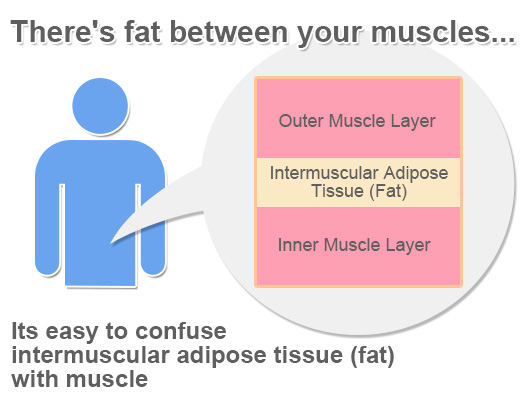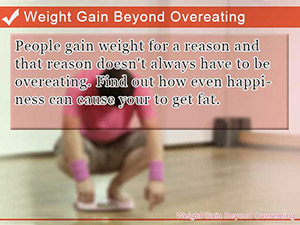Taking a look at the Japanese diet requires a multi-facet look at why people gain weight. With 120+ million strong, the people of Japan make an interesting case study and example to follow after, when looking for new ways for weight management. Here are the factors that come into play that doesn't depend on the foods you eat.
Whether it may be muscle weight, water weight, or just being in a point of your life where you are happy with how things are going, there are many reason you may be putting on weight. For whatever it may be, there are many factors behind why this happens.
The real challenge is in knowing exactly what causes this to happen and how to make sure things aren't drawn out of proportion by taking action beforehand. Let's take a look into what may be happening to you and what preventative measures are available to take hold of your weight management problems.
Weight management issues that go beyond overeating
Although excessive calorie intake by eating too much is thought of as the primarily cause for gaining weight, even by following the same healthy eating habits, it is unavoidable at times to not put on pounds. Just because you may be putting on weight isn't necessarily a bad thing.
When you work out, especially involving weight training, your body has to put on muscle mass while adjusting to increase physical demands, muscle weight. If you are conscious about your weight, you may monitor your weight by stepping on the scale throughout the day.
Depending on the timing you may notice slight fluctuations in your weight due to increased fluid intake, water weight.
As you age, your metabolism isn't the way is use to be, causing you to gain weight if not careful, middle-age weight. For whatever reason your weight has got you down, there is a remedy.
Let's take a detailed look into the process and see why it happens.
Muscle weight
You may have heard the statement that "Muscle is heavier than fat." When your body puts on muscle mass, gaining weight as a result is something we have to learn to accept. In fact, there are two reasons why this happens.
The first being the case when your bodyis putting on muscle mass. In this case, the results are easy to see when you go to the gym.
The second reason is less obvious, which is the case when you think that you are putting on muscles mass, but in fact what is happening is that your are putting on weight associate with fat.
In case you are putting on excess muscle mass
When you feel that by working out you've put on more muscle mass than expected, taking a break from exercise can help you trim down.
However, it is also possible that you are gaining muscle mass even though you are not particularly exercising. You may be wonder why all of a sudden your calf muscles have just two sized, or wrist have gotten noticeably bigger, making it look as if you've put on weight.
The reason why this happens is often related to how you go about your daily life.
For example, if you are flat footed or troubled by bunions (hallus valgus); it may be harder for you to keep balance, which takes more effort on your part.
Attaining balance in your daily activities, whether that may be standing or walking, requires more effort from your feet than usual. This is why over time avoiding your calf muscles from bulking up is difficult. Don't worry, because you are in luck.
There are ways to prevent this from happening. That is to perform foot stability strengthening exercises such as calve raises against a wall.
By training the areas along your feet, it becomes easy to keep your balance. In tern your feet are less burdened by stability issues, which prevents your body from taking control increasing the muscle mass along your calves.
In addition, it's also important to consider other circumstances that could be causing you to put on muscles mass such as dashing too much on your way to school or work. So, it is a good idea to take special care of how you go about your day and make changes accordingly.
In case you are putting on fat, instead of muscle mass
At first sight, it may seem like you are putting on muscle mass when what is actually taking place is that you are accumulating fat in the layers between your muscles. This makes it easy to misinterpret fat gain as an increase in muscle mass.

The remedy to this problem is quite simple. Since the cause of the problem is fat, not much would change in comparison to any other diet. You still would need to get more aerobic exercise to burn off the fat.
Water weight
The reason why you put on what weight is not because you are drinking too much. The real reason why this happens is that your metabolism is down, causing your body to hold on to more fluids than usual.
One common reason why this happens is edema.
When your body isn't able to get rid of fluids by means of common pathway such as perspiration or urination, what remains gets left behind. This is what causes you to get edema. How this is resolved is by setting up your body's metabolism to work properly, so that excess fluids don't accumulate in your system.
Do something that has a positive effect on your blood circulation, such as walking or taking a shower. Doing this causes you to sweat and in turn you squeeze excess fluids out of your system.
In addition, try not to take in too much salt. This too can lead to gaining water weight you don't really need.
Middle-age weight
Every now and then you might look at a picture of yourself in your prime and wonder how it is that the young you were able to stay so skinny. Don't worry it's not so much your fault.
The reason why you gain weight even while continuing to eat the same has to do with your basal metabolism.
Each of us has a distinct metabolic rate that makes it hard to look at the problem across the board.
However, in general it is said that your metabolism peaks when you are between 16 and 18 year old and goes downhill for there. That is why by eating the same amount you use to, without making adjustments is only leads to you gaining weight.
Although your calorie intake remains the same, the amount of calories your body burns is less. This is why it is easier to put on pounds as you approach middle age.
There are two ways to prevent this from happening.
It all has to do with keeping the amount of calories you burn over how much you take in everyday. This means on of two things, either exercise to burn more calories or decrease the amount you eat.
Now you see how gaining weight doesn't necessarily mean you are overeating. Depending on what stage you are in life, there are different areas to be concerned about regarding you weight management issues.
How you diagnose these issues is up to you. Be smart and find the real reason behind why you may be gaining weight.








